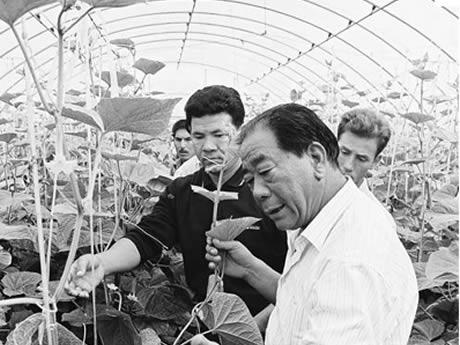Wang Leyi is at the origins of greenhouse vegetable cultivation in China. His village Sanyuanzhu, where he started the greenhouses in 1986, has grown to be the largest base of vegetables in China, with 15 million kg of vegetables supplied during the Chinese New Year.
For Wang Leyi there were no fresh vegetables in Northern China during the winter. Wang is the leader of the village Sanyuanzhu that's in Shouguang in Shandong and he started building 20 greenhouses in 1986. "Keeping these greenhouses warm takes 4 to 5 tonnes of coal, and even then only leafy vegetables could be grown there", says Wang Leyi. "Tomatoes and cucumber, which need more heat, were impossible". Despite being ill he visited Beijing and another 4 provinces where there were farmers who had successful greenhouses. He learned how to build the structures so they caught a maximum of sunlight and improved the isolation. The cost of the improved greenhouses was 6000 yuan, but in August 1989 Wang managed to convince 16 villagers to help him build 17 new greenhouses. The first attempt at growing cucumbers was successful. In the first year the 17 families earned at least 20,000 yuan, when before no one earned more than 10,000. The idea caught on: 144 new greenhouses were built with cooperation of the banks and the local government. Within a year Sanyuanzhu's families earned 10,000 on average. Now the vegetables grow all year round.

Three quarters of the vegetables in Shouguang are supplied by the 460,000 greenhouses. A logistics centre was later built. The "Shouguang Agricultural Product Logistics Park" is the largest distribution centre in Asia with its 200 ha and 2 billion investments and it's preparing a listing in Hong Kong. Last year the villagers had an income of 12,600 yuan, clearly more than the 5800 yuan national average. 150 villagers function as agricultural experts in other provinces and earn 100,000 yuan. Wang brought the technology to the other provinces and is on the road for half of the year. He has visited Xinjiang 14 times since 1993. At the end of last year Wang had helped build 28 pilot bases for modern agricultural technology in 13 provinces. He even got a visit from president Hu Jintao. His plan for the future is to build 100 bases at the edge of big or medium cities to fsupply people in the cities of organic food.
For Wang Leyi there were no fresh vegetables in Northern China during the winter. Wang is the leader of the village Sanyuanzhu that's in Shouguang in Shandong and he started building 20 greenhouses in 1986. "Keeping these greenhouses warm takes 4 to 5 tonnes of coal, and even then only leafy vegetables could be grown there", says Wang Leyi. "Tomatoes and cucumber, which need more heat, were impossible". Despite being ill he visited Beijing and another 4 provinces where there were farmers who had successful greenhouses. He learned how to build the structures so they caught a maximum of sunlight and improved the isolation. The cost of the improved greenhouses was 6000 yuan, but in August 1989 Wang managed to convince 16 villagers to help him build 17 new greenhouses. The first attempt at growing cucumbers was successful. In the first year the 17 families earned at least 20,000 yuan, when before no one earned more than 10,000. The idea caught on: 144 new greenhouses were built with cooperation of the banks and the local government. Within a year Sanyuanzhu's families earned 10,000 on average. Now the vegetables grow all year round.

Three quarters of the vegetables in Shouguang are supplied by the 460,000 greenhouses. A logistics centre was later built. The "Shouguang Agricultural Product Logistics Park" is the largest distribution centre in Asia with its 200 ha and 2 billion investments and it's preparing a listing in Hong Kong. Last year the villagers had an income of 12,600 yuan, clearly more than the 5800 yuan national average. 150 villagers function as agricultural experts in other provinces and earn 100,000 yuan. Wang brought the technology to the other provinces and is on the road for half of the year. He has visited Xinjiang 14 times since 1993. At the end of last year Wang had helped build 28 pilot bases for modern agricultural technology in 13 provinces. He even got a visit from president Hu Jintao. His plan for the future is to build 100 bases at the edge of big or medium cities to fsupply people in the cities of organic food.
Related News
Photos
More>>trade
market
finance
- Process Test Ceremony of HCRDI 5,000t/d in Russian Cement Plant
- Zhongfu Lianzhong 5MW Composite Blade & 1.5MW Bamboo Fiber Blade Offline
- Sudan s largest cement project undertaken by HCRDI completed
- HCRDI signs Vietnam 12,000t/d cement line installation contract
- First domestic oxy-fuel-fired float glass line goes into production at Huaguang





